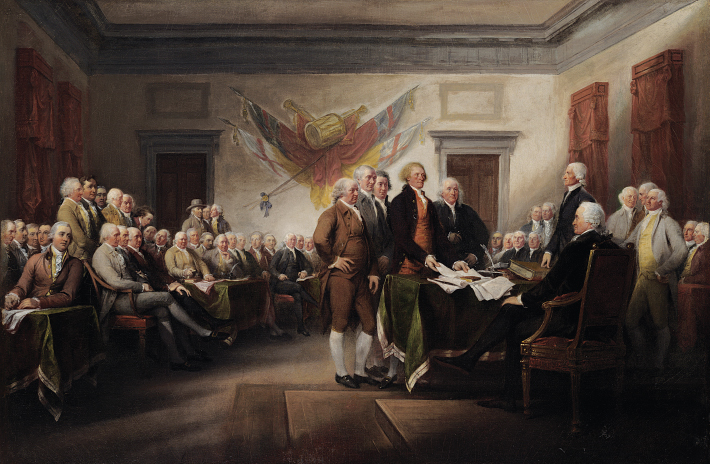America’s History: Printed Page 178
America: A Concise History: Printed Page 158
America’s History: Value Edition: Printed Page 154
Independence Declared
Inspired by Paine’s arguments and beset by armed Loyalists, Patriot conventions urged a break from Britain. In June 1776, Richard Henry Lee presented Virginia’s resolution to the Continental Congress: “That these United Colonies are, and of right ought to be, free and independent states.” Faced with certain defeat, staunch Loyalists and anti-independence moderates withdrew from the Congress, leaving committed Patriots to take the fateful step. On July 4, 1776, the Congress approved the Declaration of Independence.
The Declaration’s main author, Thomas Jefferson of Virginia, had mobilized resistance to the Coercive Acts with the pamphlet A Summary View of the Rights of British America (1774). Now, in the Declaration, he justified independence and republicanism to Americans and the world by vilifying George III: “He has plundered our seas, ravaged our coasts, burned our towns, and destroyed the lives of our people.” Such a prince was a “tyrant,” Jefferson concluded, and “is unfit to be the ruler of a free people.”
Employing the ideas of the European Enlightenment, Jefferson proclaimed a series of “self-evident” truths: “that all men are created equal”; that they possess the “unalienable rights” of “Life, Liberty, and the pursuit of Happiness”; that government derives its “just powers from the consent of the governed” and can rightly be overthrown if it “becomes destructive of these ends.” By linking these doctrines of individual liberty, popular sovereignty (the principle that ultimate power lies in the hands of the electorate), and republican government with American independence, Jefferson established them as the defining political values of the new nation.

For Jefferson, as for Paine, the pen proved mightier than the sword. The Declaration won wide support in France and Germany; at home, it sparked celebrations in rural hamlets and seaport cities, as crowds burned effigies and toppled statues of the king. On July 8, 1776, in Easton, Pennsylvania, a “great number of spectators” heard a reading of the Declaration, “gave their hearty assent with three loud huzzahs, and cried out, ‘May God long preserve and unite the Free and Independent States of America.’”